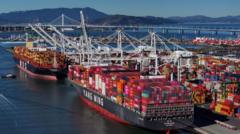The incoming administration of President-elect Donald Trump has signaled its intent to initiate a wide-ranging effort to detain and deport undocumented immigrants immediately following the inauguration. Sources have highlighted the targeting of major urban areas, particularly "sanctuary cities," as part of these operations.
**Trump Administration to Launch Sweeping Immigration Raids on Day One**

**Trump Administration to Launch Sweeping Immigration Raids on Day One**
Incoming "border czar" Tom Homan announces large-scale operations targeting illegal migrants as part of Trump's plans.
In the wake of President-elect Donald Trump's election victory, plans for aggressive immigration enforcement have emerged, with incoming "border czar" Tom Homan promising immediate raids on undocumented immigrants beginning on the first full day of the new administration. Reports indicate that operations may kick off in cities with significant migrant populations, such as Chicago, where many residents have expressed fear regarding the impact of potential enforcement actions.
Homan, known for advocating strict immigration measures, has indicated that the priority during these raids will be to apprehend criminals and gang members. His assertion that Chicago will serve as a focal point for these mass deportations aligns with Trump's broader commitment to enact the most extensive deportation program in U.S. history.
Despite Trump's bold promises for mass deportations echoed during previous campaign cycles, historical data reveals a more tempered approach during his prior term compared to that of former President Barack Obama. Under Trump's guidance, the Immigration and Customs Enforcement (ICE) agency plans to target cities that provide limited cooperation with federal immigration services, which many argue provides a safety net for vulnerable populations.
Echoing concerns from various community members, the atmosphere has become increasingly tense in areas like Chicago, where church-goers at a local congregation have shared their apprehensions. Legal immigrants have voiced their fears over uncertain situations that may arise for family members lacking legal status in the event of raids. Reverence for community ties and the family unit has surfaced as a core concern among local leaders and residents.
Under the previous administration, ICE had been directed to prioritize serious criminals, recent border crossers, and those posing national security threats, but the new directive suggests that undocumented immigrants—with or without criminal records—may now be at greater risk of deportation.
Analysts are noting that with these sweeping initiatives, there may also be logistical challenges for the Trump administration, particularly given limitations on custody space for detained migrants. Furthermore, a proposed legislative measure in Congress, known as the Laken Riley Act, is anticipated to support the federal government's aim by mandating detention for migrants suspected of criminal activity.
As the news of impending immigration raids reverberates from snowy regions to the U.S.-Mexico border, both supporters and opponents of these policies prepare for the potential ramifications of a robust new strategy to combat illegal immigration.
Homan, known for advocating strict immigration measures, has indicated that the priority during these raids will be to apprehend criminals and gang members. His assertion that Chicago will serve as a focal point for these mass deportations aligns with Trump's broader commitment to enact the most extensive deportation program in U.S. history.
Despite Trump's bold promises for mass deportations echoed during previous campaign cycles, historical data reveals a more tempered approach during his prior term compared to that of former President Barack Obama. Under Trump's guidance, the Immigration and Customs Enforcement (ICE) agency plans to target cities that provide limited cooperation with federal immigration services, which many argue provides a safety net for vulnerable populations.
Echoing concerns from various community members, the atmosphere has become increasingly tense in areas like Chicago, where church-goers at a local congregation have shared their apprehensions. Legal immigrants have voiced their fears over uncertain situations that may arise for family members lacking legal status in the event of raids. Reverence for community ties and the family unit has surfaced as a core concern among local leaders and residents.
Under the previous administration, ICE had been directed to prioritize serious criminals, recent border crossers, and those posing national security threats, but the new directive suggests that undocumented immigrants—with or without criminal records—may now be at greater risk of deportation.
Analysts are noting that with these sweeping initiatives, there may also be logistical challenges for the Trump administration, particularly given limitations on custody space for detained migrants. Furthermore, a proposed legislative measure in Congress, known as the Laken Riley Act, is anticipated to support the federal government's aim by mandating detention for migrants suspected of criminal activity.
As the news of impending immigration raids reverberates from snowy regions to the U.S.-Mexico border, both supporters and opponents of these policies prepare for the potential ramifications of a robust new strategy to combat illegal immigration.





















